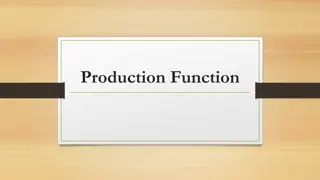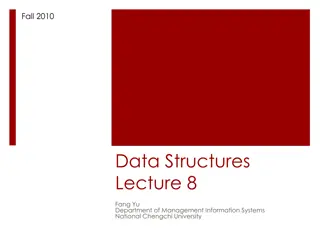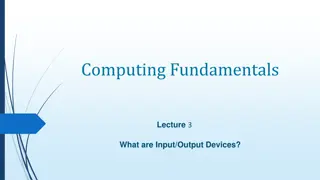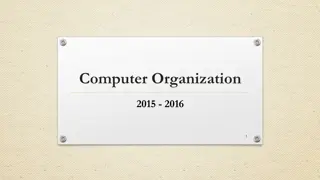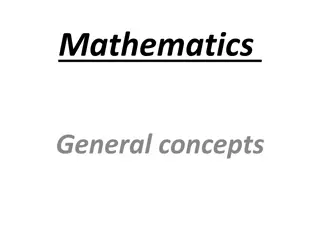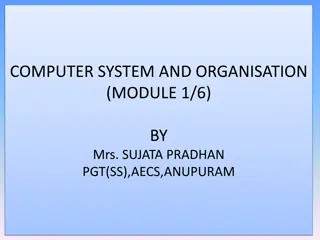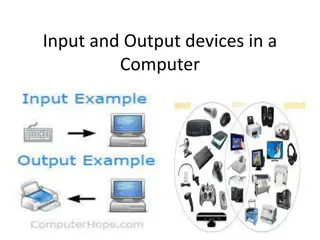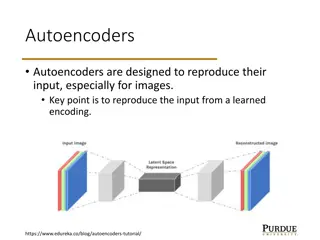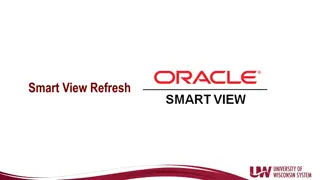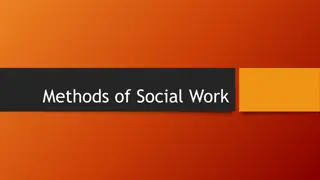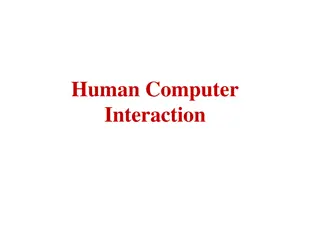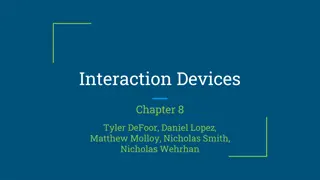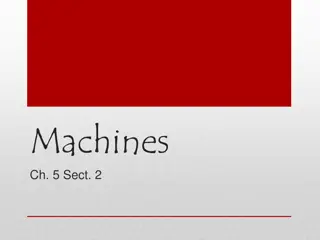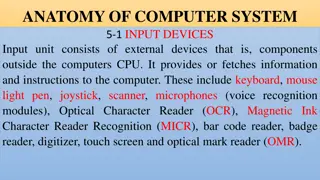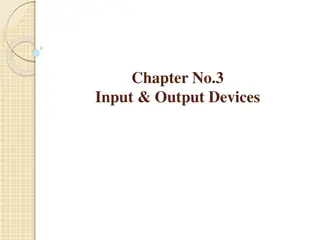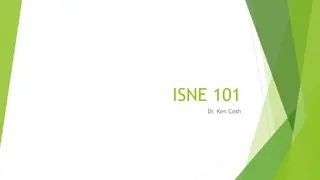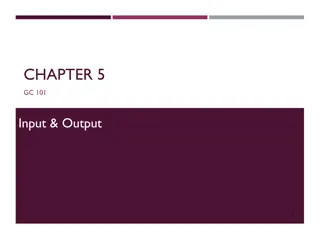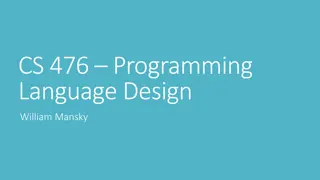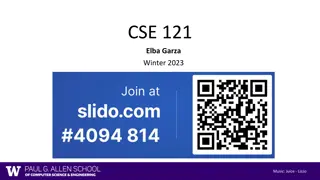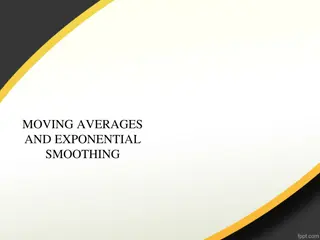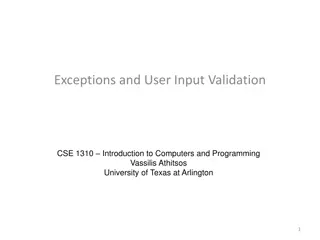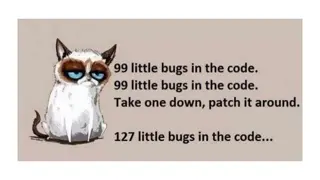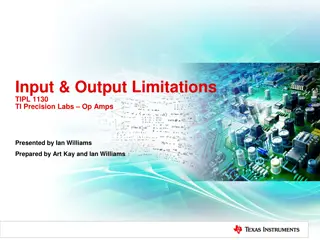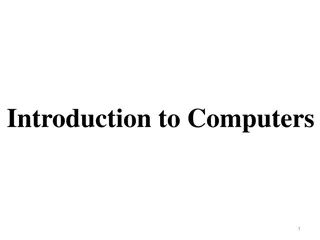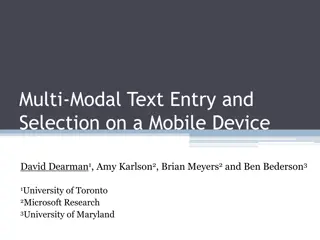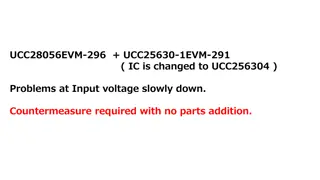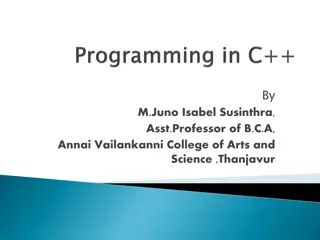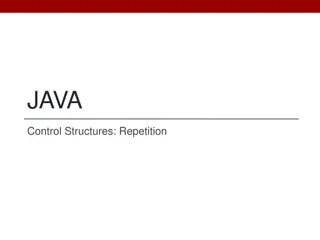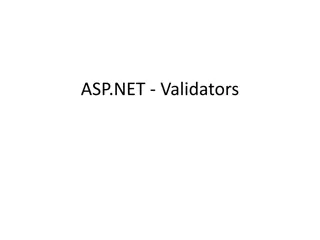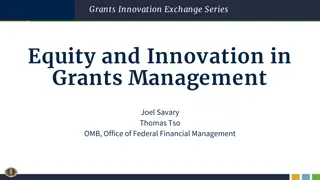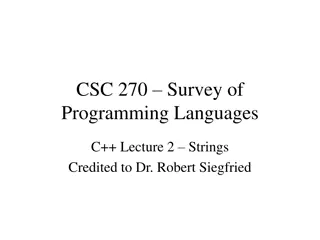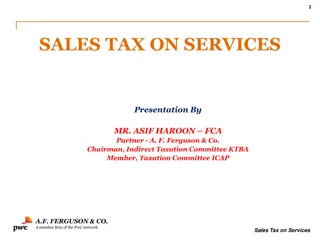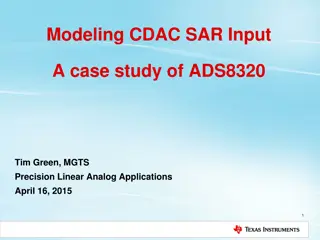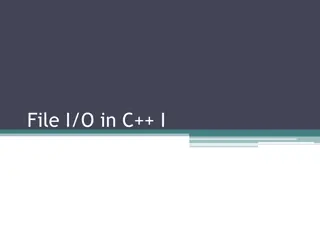GST Controversies and Input Tax Credit Issues
Explore controversies under GST related to input tax credit issues. Learn about recent cases involving reversal of credits, buyer responsibilities, and legal implications for buyers and sellers. Understand the complexities of availing input tax credits under GST.
5 views • 93 slides
Algorithm Analysis
Algorithm analysis involves evaluating the efficiency of algorithms through measures such as time and memory complexity. This analysis helps in comparing different algorithms, understanding how time scales with input size, and predicting performance as input size approaches infinity. Scaling analysi
1 views • 30 slides
Important GST Judicial Pronouncements and Case Law Updates
The content discusses significant judicial pronouncements and case law updates related to GST, focusing on issues such as reversal of input tax credit, detention of goods during transit, and responsibilities of purchasers under the CGST Act. It emphasizes the importance of compliance, clarification
3 views • 41 slides
Input-Output Models in Economics
Input-Output models, pioneered by Wassily Leontief, depict inter-industry relationships within an economy. These models analyze the dependencies between different sectors and have been utilized for studying agricultural production distribution, economic development planning, and impact analysis of i
8 views • 7 slides
Do Input Gradients Highlight Discriminative Features?
Instance-specific explanations of model predictions through input gradients are explored in this study. The key contributions include a novel evaluation framework, DiffROAR, to assess the impact of input gradient magnitudes on predictions. The study challenges Assumption (A) and delves into feature
0 views • 32 slides
The Production Function in Economics
The production function is a vital mathematical equation that determines the relationship between factors of production and the quantity of output. This function plays a crucial role in optimizing production efficiency by assisting in decision-making related to input levels, output quantities, and c
0 views • 9 slides
Algorithm Analysis: Key Concepts and Methods
Exploring algorithm analysis through topics like input-output analysis, running time evaluation, experimental studies, limitations, theoretical analysis, pseudocode explanation, and control flow details. Delve into how algorithms perform based on input sizes, types, and different analytical methods
3 views • 35 slides
Input and Output Devices in Computing
In computing, input and output devices play a crucial role in enabling communication between users and computers. Input devices are used to enter data into a computer, while output devices display or provide the results of processed information. Common input devices include keyboards, mice, and joys
1 views • 17 slides
Basic Input/Output Operations in Computer Organization
Basic Input/Output Operations are essential functions in computer systems that involve transferring data between processors and external devices like keyboards and displays. This task requires synchronization mechanisms due to differences in processing speeds. The process involves reading characters
0 views • 11 slides
Functions and Graphs in Mathematics
Functions are a fundamental concept in mathematics used to describe relationships in the real world. They can be represented through equations, graphs, tables, or verbal descriptions. A function maps elements from a domain to a range, where each input has a unique output. The domain encompasses all
0 views • 4 slides
Computer System and Organization
Computer Organization involves the logical structure of a computer, defining the interconnections of components for optimal performance. Computers process data through an Input-Process-Output cycle, with input, processing, and output units working together. The characteristics of a computer include
2 views • 20 slides
Input and Output Devices in a Computer
Input devices play a crucial role in sending data to a computer, allowing users to communicate instructions for processing, display, storage, and transmission. Key input devices include keyboards and mice, each serving specific functions and enhancing data collection and accuracy. Discover the advan
0 views • 17 slides
Variational Autoencoders (VAE) in Machine Learning
Autoencoders are neural networks designed to reproduce their input, with Variational Autoencoders (VAE) adding a probabilistic aspect to the encoding and decoding process. VAE makes use of encoder and decoder models that work together to learn probabilistic distributions for latent variables, enabli
7 views • 11 slides
Using Smart View in PlanUW: Data Input and Reporting
Learn how to efficiently input data and build reports in PlanUW using Smart View. Discover the differences between data input forms and Ad Hoc grids, understand when to use each, and explore the steps involved in entering data via Ad Hoc. Find out how to open forms and reports in Smart View, as well
1 views • 6 slides
Methods of Social Work
Methods of social work encompass various approaches aimed at enhancing social functioning and addressing problems in individuals and communities. These methods are categorized into primary and secondary methods, each serving different purposes in the field. Primary methods involve direct interaction
0 views • 20 slides
Human-Computer Interaction and Input Devices
Human-Computer Interaction involves the interaction between users and computers, exploring various input devices such as keyboards, handwriting recognition, and pointing devices. Learn about the evolution from batch data entry to modern forms of interaction, including speech recognition and stylus i
0 views • 12 slides
Overview of Interaction Devices and Keyboard Layouts
Explore various interaction devices and keyboard layouts including QWERTY, Dvorak, ABCDE, orbiTouch, phone keyboards, and other text input methods like Dasher and Grafitti. Understand the basics of data entry, general keyboard layouts, and the evolution of input methods through different technologie
0 views • 79 slides
Machines: Work, Forces, and Efficiency
Machines play a vital role in making work easier by increasing force, distance, or changing the direction of applied force. Different types of machines like levers, pulleys, and inclined planes simplify work processes. Understanding input and output forces, as well as input and output work, is essen
2 views • 10 slides
Overview of Computer Input and Output Devices
Input devices of a computer system consist of external components like keyboard, mouse, light pen, joystick, scanner, microphone, and more, that provide information and instructions to the computer. On the other hand, output devices transfer information from the computer's CPU to the user through de
0 views • 11 slides
Input and Output Devices in Computers
Input devices like keyboards, mice, joysticks, light pens, scanners, and more play a crucial role in interacting with computers. This chapter explores the functions and features of various input devices used in computing, such as keyboards for data input, mice for cursor control, and joysticks for C
1 views • 12 slides
Evolution of Input Devices in Information Systems
Explore the evolution of input devices in information systems, from early punched cards to modern touch-based and gesture interactions. Learn about the legacy of typewriters, the development of keyboards and mice, and the emergence of mobile input technologies. Discover how technology has advanced t
0 views • 43 slides
Interactive Programs and Input/Output in Java
Interactive programs in Java allow users to input data through the console, which can be captured and used in the program. This involves using the Scanner class to read user input, and understanding common Scanner methods to process different types of input. Importing Java class libraries is essenti
2 views • 15 slides
Input and Output in Programming: A Comprehensive Guide
This content provides detailed explanations and examples on input and output handling in programming, focusing on concepts such as I/O as State, typed output, and consuming input lists. It covers topics like using print statements, scanning inputs, and building output lists in programming languages.
1 views • 44 slides
Winter 2023 Course Updates and Reminders
Stay up-to-date with the latest announcements for CSE 121 taught by Elba Garza in Winter 2023. Quiz deadlines, creative project due dates, resubmission forms, and retake opportunities are highlighted. Learn about user input methods in Java programming and essential Scanner class methods. Get ready f
0 views • 5 slides
Moving Averages and Exponential Smoothing Methods
Forecasting methods like moving averages and exponential smoothing are essential for analyzing time series data. Averaging methods involve equally weighted observations, while exponential smoothing methods assign unequal weights that decay exponentially. Both methods can be useful for forecasting in
0 views • 18 slides
Input Validation in Java Programming: Handling Exceptions and User Input
Learn how to implement input validation in Java programming to prevent crashes when users provide invalid input. Explore strategies for handling exceptions like InputMismatchException and the importance of reading strings directly from user input. Discover methods for converting strings to numbers a
2 views • 33 slides
Building interactive interpreter for Calculator Language with REPL, Parsing, and Lexical Analysis
This project involves creating a user interface similar to a Read-Eval-Print Loop (REPL) for programming languages. Users can input text representations of expressions, which are then parsed, evaluated, and errors are handled accordingly before displaying the expression's value. Additionally, the st
0 views • 22 slides
Input and Output Limitations in Op Amps
Explore the various input and output limitations in TI Precision Labs Op Amps as presented by Ian Williams and prepared by Art Kay and Ian Williams. Delve into common mode voltage, voltage swing, data sheet parameters translation, input and output stages, examples of common mode voltage, and potenti
0 views • 15 slides
Scanner Class in Java: Reading User Input and Processing Files
The Scanner class in Java's java.util package allows reading input from the keyboard or files. It looks for tokens in the input, reads different types of values, and has methods like nextInt() and nextLine(). You can also read from files by creating a File object. Learn how to use Scanner to interac
0 views • 21 slides
Introduction to Computers: Understanding Hardware and Input Devices
Computers are electronic devices that process input to produce information. They consist of hardware components like CPUs, input/output units, and memory. Input devices such as keyboards, mice, and scanners help translate human-readable data for computer processing.
0 views • 11 slides
Multi-Modal Text Entry and Selection on Mobile Devices
This study delves into the exploration of various input methods on mobile devices for text entry and selection. It compares traditional touch input with alternative methods such as tilt, speech recognition, and foot tapping. Through experiments, the study evaluates the performance benefits, expressi
0 views • 31 slides
Troubleshooting AC Input Voltage Variations in UCC28056EVM-296 and UCC25630-1EVM-291
Addressing issues with input voltage fluctuations in UCC28056EVM-296 and UCC25630-1EVM-291, where the voltage slowly decreases under different load conditions. Problems include output stopping at varying AC voltages based on load and hunching behavior at different load levels. Countermeasures are ne
0 views • 7 slides
C++ Streams and I/O Operations
C++ streams play a crucial role in handling input/output operations by linking logical devices to physical ones. They provide a uniform interface for programmers to work with various devices efficiently. This article covers the basics of C++ streams, input/output streams, common functionalities like
0 views • 17 slides
Introduction to Java Control Structures: Repetition
Learn how to implement repetitive algorithms using loops in Java. Practice using boolean expressions, Scanner for user input, and the declaration and use of methods. Explore the three basic control structures: Sequence, Selection, and Repetition. Discover the motivation behind repetition and how to
0 views • 23 slides
ASP.NET Validators and Validation Controls
ASP.NET validation controls play a crucial role in ensuring that user input data is valid and secure. They help prevent the storage of useless or contradictory data by validating input fields. Key validation controls include RequiredFieldValidator, RangeValidator, CompareValidator, RegularExpression
0 views • 37 slides
Opportunities for Feedback and Input on Government Programs
The Office of Management and Budget (OMB) and various agencies are seeking public input through Requests for Information (RFIs) on advancing equity and support for underserved communities. Examples include input on USDA programs, FEMA policies, National Library of Medicine opportunities, and more. P
0 views • 8 slides
Introduction to C++ Programming: Strings and Predefined Functions
This lecture covers essential concepts and functions related to strings in C++, including predefined functions in
0 views • 49 slides
Sales Tax on Services in Pakistan
This presentation by Mr. Asif Haroon FCA covers topics such as claiming input tax and special procedures related to sales tax on services in Pakistan. It delves into the laws under which sales tax is collected and who can claim input tax. The presentation also discusses different situations where ou
0 views • 38 slides
Modeling CDAC SAR Input: A Case Study of ADS8320
This case study delves into modeling the SAR input of ADS8320, exploring the number of time constants vs. ADC resolution, voltage-controlled switches in SPICE, and the correct parameters for modeling SAR ADC. It also covers the specifications of ADS8320, including analog input characteristics, sampl
0 views • 22 slides
File Input/Output (I/O) in C++
File Input/Output (I/O) is an essential concept in C++ programming, allowing for interaction with files stored on secondary storage devices. This involves steps like including the fstream header file, declaring file stream variables, associating them with input/output sources, opening the file, perf
0 views • 19 slides





